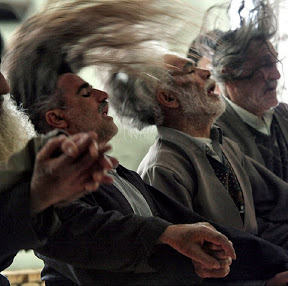Spinning in Progress

Afghanistan is a country often associated with fundamentalist Islamic faith and only very few people – as Marian Brehmer puts it in his article on Qantara – „today would regard Afghanistan as the cradle of a moderate and sensitive Islamic culture that has made significant contributions to poetry and music“. But in fact Sufism, the mystical drift of Islam, has been playing a major role in the Hindu Kush state for hundreds of years and still does.
Important Sufi masters such as Khwaja Abdullah Ansari, Hakim Sana’i and Jalaluddin Rumi were born in the region of todays state. During all the country’s history Sufis served as advisors of the ruling families and attended the coronation ceremonies. When King Amanullah came to power in 1919, Sufis united with orthodox Muslims against his plans of reforms, which in their eyes threatened their religious practices. In the Sovjet-Afghan War between 1979 and 1989 two Sufi masters served as considerable leaders to the mudjahideen fighters, and one of them – Sibghatullah Mojaddidi – was even named interim president of Afghanistan in 1992.
[widgetkit id=17965]
Until today nearly every Afghan is somehow related to Sufism in his country. The majority of the population, even if they do not formally belong to an order, view Islam through the glasses of Sufism. A book recently published by American author Kenneth P. Lizzio called „Embattled Saints“ depicts the character of nowadays Sufi orders. Lizzio has been living with them in the areas on the Afghan-Pakistani border for one year and reports on meeting warm-hearted, educated people, who managed to maintain their traditions during a long period of time. Nevertheless, the faithful of Sufism are being hunted, threatened and killed by the Taliban in Afghanistan nowadays.
Sufism is a mystical concept related to Islam, focussing on the physical experience of divinity and the supranatural. Practices such as dancing, chanting and music are considered to build an intense connection with the transcendent.
Sufis are organized in orders around teachers, not invariably linked to Islam. Some of these orders are practising the Dhikr mandated by the Qur’an in the form of a whirling dance, known as „Dervish Turning“, which for example can also be interpreted as representation of the stars’ circling.
With its focused advocacy of mystical experiences, Sufism can have an effective approach to fighting extremism. This would also save a great deal of effort. And, more importantly, it could lead war-torn regions like Afghanistan or Syria towards its rich cultural roots. It would provide an important contribution to the stability of the region.
Already the West-östlicher Diwan, a collection of lyrical poems by the German poet Johann Wolfgang von Goethe was inspired by the Persian Sufi poet Hafez. It is part of Goethe’s late work and the last great cycle of poetry he worked on (1814 and 1819).-

The Turkish dancer and choreograph, Ziya Azazi, is using techniques of the Sufis in his performances. In his workshops „Dervish in Progress“ he focusses on the last of the four spiritual doors deriving from Sufism: The doors of the Law („Schari’a“), the Path („Tariqa“), Realization („Haqiqa“) and Discernment („Ma’rifa“). His performance deals in a non-religious way with knowing and recognizing the self, showing completeness and clarity in every move with the typical skirt outlining the dancer’s grace.
A dancing workshop by Ziza Azazi using the Dervish whirls to unfold the energy of the participants and providing them with the opportunity to get to know their bodies and boundaries will be held in Istanbul from April 6th to 10th, organized by Diyalog and the Goethe-Institut.
For more information and to apply for it, click here.

